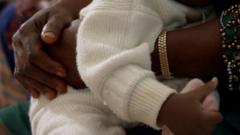In Nigeria, societal pressure for women to bear children can lead to desperate decisions, exemplified by the case of Chioma, who claims her baby Hope is the result of a miraculous "cryptic pregnancy." After eight years of infertility, Chioma finds herself at the center of a disturbing controversy as her husband's family questions the legitimacy of her claims. They are not alone; officials also struggle to comprehend her assertion of having carried Hope for an extended 15 months.
The commissioner for women affairs in Anambra, Ify Obinabo, is investigating the high-stakes scam targeting desperate women. Unbeknownst to many, Chioma’s plight is part of a larger scam involving the trafficking of newborns. Chioma reveals that to fulfill familial expectations, she resorted to a dubious clinic offering fake fertility treatments that exploit women's vulnerabilities.
For over a year, investigative teams from BBC Africa Eye have been examining this “cryptic pregnancy” scandal. Scammers masquerade as medical professionals, luring women into their schemes with promises of miracle fertility treatment, which often results in a series of alarming procedures devoid of scientific validity. Many women, instructed not to consult legitimate medical practitioners, end up believing they are pregnant due to scammers' planted substances causing physical changes.
Infiltrating one of these fraudulent clinics, investigators met a woman dubbed "Dr. Ruth," where dozens of hopeful women crowd the halls. Claiming she could guarantee pregnancies, "Dr. Ruth" offers injections and expensive pills with no scientific backing. Reports from former patients highlight harrowing experiences involving sedation and simulated births where women believe they have given birth to babies they never carried.
The depth of misinformation surrounding cryptic pregnancies resurfaces, revealing online communities that propagate these false claims. In these spaces, both scammers and unsuspecting women share misleading resources, reinforcing false beliefs in miracle cures and pregnancies.
As the Anambra health ministry begins actions against these fraudulent practices, the situation intensifies. Footage from raids depicts pregnant women held captive, with some coerced into relinquishing their babies for money. Uju, one such captured woman, was offered financial compensation for her baby and expresses deep confusion about her situation.
In a tense confrontation, commissioner Obinabo considers removing Hope from Chioma's care but ultimately decides to let them keep him for now, citing Chioma's victimization as a crucial factor. As the authorities work to dismantle this web of deception, experts warn the underlying issues that enable such scams—infertility stigmas, reproductive rights, and societal attitudes towards motherhood—must change to eradicate their prevalence in Nigerian society.




















